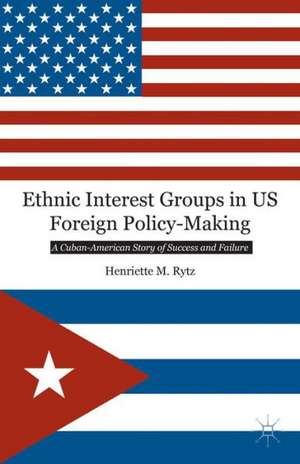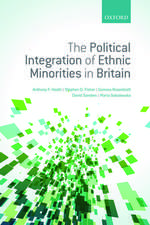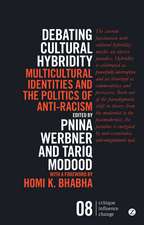Ethnic Interest Groups in US Foreign Policy-Making: A Cuban-American Story of Success and Failure
Autor H. Rytzen Limba Engleză Hardback – 17 oct 2013
| Toate formatele și edițiile | Preț | Express |
|---|---|---|
| Paperback (1) | 637.59 lei 6-8 săpt. | |
| Palgrave Macmillan US – 17 oct 2013 | 637.59 lei 6-8 săpt. | |
| Hardback (1) | 641.71 lei 6-8 săpt. | |
| Palgrave Macmillan US – 17 oct 2013 | 641.71 lei 6-8 săpt. |
Preț: 641.71 lei
Preț vechi: 754.95 lei
-15% Nou
Puncte Express: 963
Preț estimativ în valută:
122.80€ • 131.31$ • 102.38£
122.80€ • 131.31$ • 102.38£
Carte tipărită la comandă
Livrare economică 17 aprilie-01 mai
Preluare comenzi: 021 569.72.76
Specificații
ISBN-13: 9781137349798
ISBN-10: 1137349794
Pagini: 277
Ilustrații: XIV, 277 p. 5 illus.
Dimensiuni: 140 x 216 x 20 mm
Greutate: 0.45 kg
Ediția:2013
Editura: Palgrave Macmillan US
Colecția Palgrave Macmillan
Locul publicării:New York, United States
ISBN-10: 1137349794
Pagini: 277
Ilustrații: XIV, 277 p. 5 illus.
Dimensiuni: 140 x 216 x 20 mm
Greutate: 0.45 kg
Ediția:2013
Editura: Palgrave Macmillan US
Colecția Palgrave Macmillan
Locul publicării:New York, United States
Cuprins
Introduction 1. The Debate over Ethnic Interest Group Influence 2. The Analysis of Ethnic Interest Group Influence 3. Cuban?American Influence on US Cuba Policy 4. Conclusion Epilogue
Recenzii
"This is an excellent piece of scholarship that is interesting, provocative, empirical, theoretically grounded, and exceptionally well written." Patrick J. Haney, Professor, Miami University, USA
"Despite all the hype about the alleged influence of, say, the 'Jewish lobby' or of Cuban Americans on US policies toward Israel or Cuba, we know surprisingly little about the role of such ethnic interest groups in American foreign policy. Therefore, this book closes a very significant gap in the literature. Henriette Rytz argues, first, that ethnic interest groups can be analyzed in pretty much the same way as other lobby groups in US foreign policy, except that collective identities motivate the activities in this case. Second, however, even most powerful ethnic interest groups such as the Cuban Americans do not get their way all the time, but have to align their discourse with main trends in US foreign policy. In sum, this excellent and extremely well researched book systematically theorizes the variation in the impact of ethnic interest groups on US foreign policy." Thomas Risse, Professor of International Politics, Freie Universität Berlin, Germany
"Despite all the hype about the alleged influence of, say, the 'Jewish lobby' or of Cuban Americans on US policies toward Israel or Cuba, we know surprisingly little about the role of such ethnic interest groups in American foreign policy. Therefore, this book closes a very significant gap in the literature. Henriette Rytz argues, first, that ethnic interest groups can be analyzed in pretty much the same way as other lobby groups in US foreign policy, except that collective identities motivate the activities in this case. Second, however, even most powerful ethnic interest groups such as the Cuban Americans do not get their way all the time, but have to align their discourse with main trends in US foreign policy. In sum, this excellent and extremely well researched book systematically theorizes the variation in the impact of ethnic interest groups on US foreign policy." Thomas Risse, Professor of International Politics, Freie Universität Berlin, Germany
Notă biografică
Henriette M. Rytz is Research Associate with the German Institute for International and Security Affairs, Berlin, Germany.












